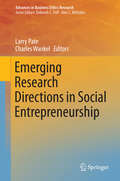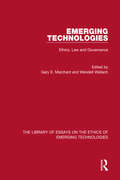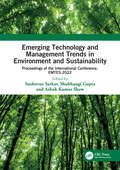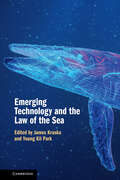- Table View
- List View
Emerging Powers, Global Justice and International Economic Law: Reformers of an Unjust Order?
by Andreas BuserThe book assesses emerging powers’ influence on international economic law and analyses whether their rhetoric of reforming this ‘unjust’ order translates into concrete reforms. The questions at the heart of the book surround the extent to which Brazil, Russia, India, China, and South Africa individually and as a bloc (BRICS) provide alternative regulatory ideas to those of ‘Western’ States and whether they are able to convert their increased power into influence on global regulation. To do so, the book investigates two broader case studies, namely, the reform of international investment agreements and WTO reform negotiations since the start of the Doha Development Round. As a general outcome, it finds that emerging powers do not radically challenge established law. ‘Third World’ rhetoric mostly does not translate into practice and rather serves to veil economic interests. Still, emerging powers provide for some alternative regulatory ideas, already leading to a diversification of international economic law. As a general rule, they tend to support norms that allow host States much policy space which could be used to protect and fulfil socio-economic human rights, especially – but not only – in the Global South.
Emerging Research Directions in Social Entrepreneurship
by Larry Pate Charles WankelThis book takes an inside-out approach to examine the broad topic of social entrepreneurship. Instead of looking inward at what social entrepreneurship is, this book looks forward from the view of successful social entrepreneurs to answer the important question, "Where is social entrepreneurship going next?" First, the volume looks at the essential qualities of social entrepreneurs, including the importance of humility as a trait in the social entrepreneur, the way in which social entrepreneurs define themselves as such, and if and how opportunity recognition differs in social and traditional entrepreneurs. Next, the volume looks at the impact of social entrepreneurial businesses on individuals but also on the supply chain, other businesses and the wider community. Next, the book explores social entrepreneurship and global change. This rare and compelling section, offers key insights and lessons in the development and promotion of social entrepreneurship in the global economy. This volume addresses both theory and research, suggesting practical solutions. It engages scholars and practitioners across disciplines in an examination and debate about various methods and approaches of enacting programs of social change.
Emerging Technologies, Novel Crimes, and Security: The Good, the Bad, and the Ugly
by Hedi NasheriThis book provides a holistic overview of the complexities of modern technological advances and their implications for crime and security. It examines the societal dilemmas that accompany these technologies, their strategic impact on geopolitics, governments, business, and civil society.The increasingly interconnected world gives rise to novel crimes and creates a new, complex set of threats. Understanding this landscape is essential to strategizing for the prevention, protection, mitigation, and risk assessment of technology-related crime.Practical and approachable, this book builds knowledge and awareness of the impact of emerging technologies on crime and security among professionals, students, academicians, researchers, and policymakers.
Emerging Technologies: Ethics, Law and Governance (The\library Of Essays On The Ethics Of Emerging Technologies Ser.)
by Gary E. Marchant Wendell WallachEmerging technologies present a challenging but fascinating set of ethical, legal and regulatory issues. The articles selected for this volume provide a broad overview of the most influential historical and current thinking in this area and show that existing frameworks are often inadequate to address new technologies - such as biotechnology, nanotechnology, synthetic biology and robotics - and innovative new models are needed. This collection brings together invaluable, innovative and often complementary approaches for overcoming the unique challenges of emerging technology ethics and governance.
Emerging Technology and Management Trends in Environment and Sustainability: Proceedings of the International Conference, EMTES-2022
by Sushovan Sarkar Shubhangi Gupta Ashok Kumar ShawThe International Conference (EMTES 2022) is oriented to include the themes like Water Quality Management, Advanced Water Treatment, Advanced Wastewater Treatment, Assessment and Control of Air Pollution, Solid and Hazardous Waste Management, Prevention of Groundwater Contamination, Wetland Management/Phyto-remediation, Case studies in Industrial Pollution Control, Liquid waste management, recent advancement in engineering, technology and management for optimization of environmental issues, application of IOT and IT in remedial measure of Environment and sustainability, Health issues and safety.
Emerging Technology and the Law of the Sea
by James Kraska Young Kil ParkAutonomous vessels and robotics, artificial Intelligence and cybersecurity are transforming international shipping and naval operations. Likewise, blockchain offers new efficiencies for compliance with international shipping records, while renewable energy from currents and waves and offshore nuclear power stations open opportunities for new sources of power within and from the sea. These and other emerging technologies pose a challenge for the governance framework of the law of the sea, which is adapting to accommodate the accelerating rates of global change. This volume examines how the latest technological advances and marine sciences are reshaping the interpretation and application of the law of the sea. The authors explore the legality of new concepts for military operations on the continental shelf, suggest remote sensing methodologies for delimitation of maritime boundaries, and offer a legal roadmap for ensuring maritime cyber security.
Emerging Threats of Synthetic Biology and Biotechnology: Addressing Security and Resilience Issues (NATO Science for Peace and Security Series C: Environmental Security)
by Igor Linkov Benjamin D. Trump Marie-Valentine Florin Edward PerkinsSynthetic biology is a field of biotechnology that is rapidly growing in various applications, such as in medicine, environmental sustainability, and energy production. However these technologies also have unforeseen risks and applications to humans and the environment. This open access book presents discussions on risks and mitigation strategies for these technologies including biosecurity, or the potential of synthetic biology technologies and processes to be deliberately misused for nefarious purposes. The book presents strategies to prevent, mitigate, and recover from ‘dual-use concern’ biosecurity challenges that may be raised by individuals, rogue states, or non-state actors. Several key topics are explored including opportunities to develop more coherent and scalable approaches to govern biosecurity from a laboratory perspective up to the international scale and strategies to prevent potential health and environmental hazards posed by deliberate misuse of synthetic biology without stifling innovation. The book brings together the expertise of top scholars in synthetic biology and biotechnology risk assessment, management, and communication to discuss potential biosecurity governing strategies and offer perspectives for collaboration in oversight and future regulatory guidance.
Emerging Trends in Psychology, Law, Communication Studies, Culture, Religion, and Literature in the Global Digital Revolution: Proceedings of the 1st International Conference on Social Sciences Series: Psychology, Law, Communication Studies, Culture, Religion, and Literature (SOSCIS 2019), July 10 2019, Semarang Indonesia
by Yulianto Budi Setiawan Santi RahmawatiThe Fourth Industrial Revolution has the potential to raise global income levels and improve the quality of life for populations around the world. Technology development of AI, self-driving, big data, the Internet of things, and many digital revolutions have changed how people interact with each other. Therefore, developing a comprehensive and globally shared view of how technology is affecting our lives and reshaping our social, cultural, and human environments is essential. There has never been a time of more significant promise, or one of greater potential peril. Today’s decision-makers, however, are too often trapped in traditional, linear thinking, or too absorbed by the multiple crises demanding their attention, to think strategically about the forces of disruption and innovation shaping our future.The main goal of the conference was to provide an outlet for papers discussing the importance and impact of industrial revolution 4.0 to influence social aspect in human life. The proceedings consist of papers covering issues on psychology, law, communication studies, culture, religion, and literature. The proceedings will provide the latest research and constitute a concise but timely medium for the dissemination.The Proceedings of the 1st International Conference on Social Sciences Series (SOSCIS 2019) will be invaluable to professionals and academics in psychology, law, communication studies, culture, religion, and literature.
Emerging Values in Health Care: The Challenge for Professionals
by Huw Thomas Brian Hurwitz Derek Sellman Ben Hannigan Roisin Pill Chris Swift Stephen Pattison Paul Ballard Heather Skirton Moira Dumma Lynn Knight Kieran Sweeney Julia Mckeown Alan Nathan Chrissie Hockley Andrew Edgar Bronwen Davies Srikant Sarangi David Badcott Paquita De ZuluetaProfessional values in healthcare are in a state of constant and increasingly rapid change. While all professions now emphasise teamwork and collegiality in practice, fewer are inclined to consider shared or differing values across professions. This interdisciplinary volume explains how health care professions and their values have changed over the last forty years, charting where they have come from, where they are now, and how they might develop in the future. There is coverage of a wide range of different professions within healthcare, from GPs, mental health nurses, adult nurses and pharmacists, to NHS managers and chaplains. Chapters are followed by critical responses from senior healthcare practitioners. This original and insightful book will be a valuable resource for academics, researchers, senior healthcare professionals and healthcare managers.
Emerging Voices for Animals in Tourism
by Edited by Jes Hooper and Carol KlineWhile the study of animal-human interactions within the context of tourism has been explored in a greater number and diversity of ways within the last decade, the discourse remains divided between traditional tourism academia and outside disciplines 'looking in'. Tourism academia has borrowed philosophical, ethical, gender studies, sociological, ecological conservation, and economic lenses to explore animals in tourism, however collaboration with authors external to tourism studies remains few. This edited volume strengthens the bridge between tourism academia and other disciplines by highlighting the fresh perspectives, emerging methodologies and innovative interdisciplinary conventions at the forefront of animals in tourism research, whilst critically working towards more ethical human-animal interactions within the tourism and leisure space. Split into four parts 'emerging motivations', 'emerging cultures', 'emerging narratives', and 'emerging reflections', this book offers readers a rich text grounded in progressive scholarly praxis including: * Research focussed on a wide range of animal taxa, geographic locations, and touristic contexts to help move the conversation toward multi-faceted solutions. * An eclectic selection of methodological approaches from multispecies ethnography to storytelling, literary and media analyses and participant survey that showcases the emerging interdisciplinary practices. * Representation of emerging voices from various fields and disciplines around the world. This unique text will be widely applicable to scholars working towards equitable human-animal interactions within tourism.
Emerson's Literary Philosophy
by Reza HosseiniThis book situates Ralph Waldo Emerson in the tradition of philosophy as “spiritual exercise”, arguing that the defining feature of his literary philosophy is the conviction that there is an inherent link between moral persuasion and literary excellence. Hosseini persuasively argues that the Emersonian project can be viewed as an extension of Socrates’ call for a return to the beginning of philosophy, to search for a way of revolutionizing our ways of seeing from within. Examining Emerson’s provocative style of writing, Hosseini contends that his prose is shaped by a desire to bring about psychagogia, or influencing the soul through the power of words. This book furthermore examines the evolving nature of Emerson’s thoughts on “scholarly action” and its implications, his religious temperament as an aesthetic experience of the world through wonder, and the reasons for a resounding acknowledgment of despair in his essay “Experience.” In the concluding chapter, Hosseini explores the depth of Emerson’s engagement with the classical Persian poets and argues that what we may call his “literary humanism” is informed by Persian Adab, exemplified in the writings of Rumi, Hafiz, and Saadi. Weaving together themes from Persian philosophy and Emersonian transcendentalism, Hosseini establishes Emerson’s way of seeing as refreshingly relevant, showing that the questions he tackled in his writings are as pressing today as they were in his time.
Eminent Domain
by Ilya Somin Iljoong Kim Hojun LeeIn 2005, the Supreme Court ruled that the city of New London, Connecticut, could condemn fifteen residential properties in order to transfer them to a new private owner. Although the Fifth Amendment only permits the taking of private property for "public use," the Court ruled that the transfer of condemned land to private parties for "economic development" is permitted by the Constitution--even if the government cannot prove that the expected development will ever actually happen. The Court's decision in Kelo v. City of New London empowered the grasping hand of the state at the expense of the invisible hand of the market. In this detailed study of one of the most controversial Supreme Court cases in modern times, Ilya Somin argues that Kelo was a grave error. Economic development and "blight" condemnations are unconstitutional under both originalist and most "living constitution" theories of legal interpretation. They also victimize the poor and the politically weak for the benefit of powerful interest groups and often destroy more economic value than they create. Kelo itself exemplifies these patterns. The residents targeted for condemnation lacked the influence needed to combat the formidable government and corporate interests arrayed against them. Moreover, the city's poorly conceived development plan ultimately failed: the condemned land lies empty to this day, occupied only by feral cats. The Supreme Court's unpopular ruling triggered an unprecedented political reaction, with forty-five states passing new laws intended to limit the use of eminent domain. But many of the new laws impose few or no genuine constraints on takings. The Kelo backlash led to significant progress, but not nearly as much as it may have seemed. Despite its outcome, the closely divided 5-4 ruling shattered what many believed to be a consensus that virtually any condemnation qualifies as a public use under the Fifth Amendment. It also showed that there is widespread public opposition to eminent domain abuse. With controversy over takings sure to continue, The Grasping Hand offers the first book-length analysis of Kelo by a legal scholar, alongside a broader history of the dispute over public use and eminent domain and an evaluation of options for reform.
Eminent Domain
by Ronald D. Demmans&“…a crackerjack read, very satisfying as a novel with its exciting twists and turns, yet at the same time insightful and funny…&” – Eric Wilson, Author of Murder on the CanadianBrett Simmons and the town of Lenore are inextricably linked. Brett Simmons, the brash, wise-cracking, unapologetic lawyer and Lenore, the hometown he loves. Two innocuous words of legalese will lead Brett down a dangerous path of lies, deceit and ultimately murder. He has taken a look behind the curtain…the wrong curtain. He has seen too much and what he has uncovered could cost him everything: his career, his freedom, even his life. With the odds clearly stacked against him and the future of Lenore at stake, Brett engages in a battle with Warren Winfield, Lenore&’s corrupt mayor and a ruthless international criminal cartel. Alone, Brett Simmons stands little chance of winning. But Brett is not alone in his fight. He finds himself partnered with Melanie Stockton, a beautiful, tough-as-nails cop. The rapport is instantaneous; the attraction, unexpected. With Brett going undercover and Melanie forced to confront a well-armed band of mercenaries, whatever feelings they have for each other will have to be put on hold…and the waiting might take forever. This is Brett Simmons&’ story…and only he can tell it.
Emmanuel Levinas and the Limits to Ethics: A Critique and a Re-Appropriation (Routledge Jewish Studies Series)
by Aryeh BotwinickEmanuel Levinas and the Limits to Ethics highlights how radically different Jewish ethics is from Christian ethics, and the profound affinities that subsist between Jewish ethics and philosophical and political liberalism. The philosophy of Emmanuel Levinas has captured the imagination of a global constituency who take his absolutizing of ethical demands and his assigning primacy to ethics over all other branches of inquiry in his mapping of Western philosophy to be indicative of a major re-ordering of both personal and cultural identity. It is this re-ordering, they believe, that would restore greater wholeness and value to human life. In this book, Aryeh Botwinick takes issue with both the theoretical analysis that Levinas engages in, and the practical ethical import that he draws from it. Arguing that what Levinas has to say about both skepticism and negative theology can be used to re-route his argument away from the avowed aims of his thought, this book will be of great interest to students and scholars of Jewish Studies, Ethics and Philosophy.
Emmanuel Levinas: Ethics, Justice, and the Human Beyond Being
by Lis ThomasThis book explores Levinas's rethinking of the meaning of ethics, justice and the human from a position that affirms but goes beyond the anti-humanist philosophy of the twentieth century
Emotion (New Problems of Philosophy)
by Charlie KurthEmotions have long been of interest to philosophers and have deep historical roots going back to the Ancients. They have also become one of the most exciting areas of current research in philosophy, the cognitive sciences, and beyond. In this book, Charlie Kurth explains the philosophy of the emotions, structuring the book around seven fundamental questions: What are emotions? Are emotions natural kinds? Do animals have emotions? Are emotions epistemically valuable? Are emotions the foundation for value and morality? Are emotions the basis for responsibility? Do emotions make us better people? In the course of exploring these questions, he also discusses cutting-edge empirical research on emotion, feminist approaches to emotions and their value, and methodological questions on how to theorize about the emotions. The book also contains in-depth discussions of specific emotions like compassion, disgust, anxiety, and curiosity. It also highlights emerging trends in emotion research. Including suggestions for further reading and a glossary of key terms, Emotion is ideal for those studying and researching the philosophy of emotion as well as ethics, epistemology, and the philosophies of mind and psychology.
Emotion and Virtue
by Gopal SreenivasanA novel approach to the crucial role emotion plays in virtuous actionWhat must a person be like to possess a virtue in full measure? What sort of psychological constitution does one need to be an exemplar of compassion, say, or of courage? Focusing on these two examples, Emotion and Virtue ingeniously argues that certain emotion traits play an indispensable role in virtue. With exemplars of compassion, for instance, this role is played by a modified sympathy trait, which is central to enabling these exemplars to be reliably correct judges of the compassionate thing to do in various practical situations. Indeed, according to Gopal Sreenivasan, the virtue of compassion is, in a sense, a modified sympathy trait, just as courage is a modified fear trait.While he upholds the traditional definition of virtue as a species of character trait, Sreenivasan discards other traditional precepts. For example, he rejects the unity of the virtues and raises new questions about when virtue should be taught. Unlike orthodox virtue ethics, moreover, his account does not aspire to rival consequentialism and deontology. Instead Sreenivasan repudiates the ambitions of virtue imperialism.Emotion and Virtue makes significant contributions to moral psychology and the theory of virtue alike.
Emotional Data Applications and Regulation of Artificial Intelligence in Society (Law, Governance and Technology Series #69)
by Rosa Ballardini Rob van den Hoven van Genderen Sari JärvinenThis revolutionary new book on using AI to process human emotion data seeks to raise awareness for the topic, thoroughly discuss it from a multidisciplinary perspective and, by doing so, disseminate research findings that elaborate on the current and future regulatory needs for the responsible and ethical development and application of emotional AI. Biometric and psychological data of humans are the most sensitive data on human behavior. The book’s objective is to provide a holistic understanding of key challenges and propose novel, workable, substantive and methodological solutions for navigating current and future legal and ethical needs and dilemmas regarding the processes of developing and using emotional AI. Although both the academic community and political decision-makers continue to intensively discuss issues in the ethical regulation of AI, there is still a very limited understanding of both the opportunities and the risks in connection with emotional AI specifically. Yet, emotional AI is one of the most promising areas of AI developments and applications. Several of these innovations could be a welcome change in our society, as they could improve our well-being in various ways. That being said, these inventions require considerable investments. Thus, legal incentives such as IPRs are crucial to supporting investment in these fields. Further, these innovations might have negative effects on the privacy and autonomy of natural persons, raising both legal and ethical concerns. Thus, their legal and ethical acceptability, as well as their societal acceptance, might be challenged by several legal provisions in the EU, such as the GDPR; regulations on communications, social platforms, and marketing; and the draft AI Act. Yet, the current legal landscape for emotional AI in Europe is anything but clear – an aspect that becomes even more apparent when we consider the global picture of the regulatory framework for emotional AI. In this book, a diverse team of internationally respected experts addresses these issues, engaging in a multidisciplinary study into techno-economic-legal developments concerning emotional AI, its impacts, and the need for action. The book offers in-depth scientific and societally relevant insights on the past, present and future of AI in general, especially its many implications for law and policy. Although the primary target audience for the book are academics from the field of law, the book also offers sound guidance for legislators and general policymakers, as well as companies and organizations.
Emotional Literacy in Criminal Justice
by Charlotte KnightEmotions remain largely invisible in the management of criminal justice practice. This book seeks to uncover some of the underground emotional work of practitioners and make visible the impact of both positive and negative emotions, which play a crucial role in practitioner-offender relationships. Exploring how practitioners understand, regulate and work with emotion, Knight argues that the 'soft skills' of emotion are more likely to achieve motivation and change in offenders than the 'hard' skills of punishment, monitoring and surveillance. The book examines some of the gendered implications of this practice and develops an argument for the explicit building of emotional resources within organizations to sustain the development, enhancement and support of emotional literacy in the workforce. Using practice examples, Knight reveals how practitioners can benefit from having an understanding of their own emotions and how these can impact on their practice. This unique and accessible book will be a valuable resource to practitioners across the criminal justice sector including probation officers, youth justice workers, police and prison officers, social workers, policymakers and managers, as well as scholars working within criminology, criminal justice and probation.
Emotional Workplace Abuse: A New Research Approach
by Elina Penttinen Marjut Jyrkinen Elisabeth WideAddressing emotional workplace abuse, this Palgrave Pivot takes a multidisciplinary approach which combines feminist research on violence with organisation and management studies, in order to offer a new approach on workplace violations. The book analyses why it is difficult for targets and organisations alike to name and identify emotional abuse and addresses the severe negative effects of abuse on the targets’ lives. It brings ethical leadership to the fore as a means to foster sustainable organisations. Using empirical data and research, this book highlights subtle forms of violations that take place in the workplace, and provides analysis from the perspective of the target. A valuable read for scholars and practitioners involved in organisational management and HRM, Emotional Workplace Abuse will help readers to understand the importance of sustainable leadership in preventing emotional workplace abuse.
Emotional kompetent agieren: Das eigene Denken, Fühlen und Handeln bewusst verstehen und verändern
by Rolf ArnoldDieses Buch beschreibt mit dem Modus des Agil-Seins („Being agile“) eine Form des geübten Umgangs mit sich selbst und anderen, der uns dazu verhelfen kann, zu werden, wer wir eigentlich sind. Das Konzept „Being agile“ verhilft insbesondere Führungskräften zu einer Persönlichkeitsentwicklung, die sie zu sich selbst kommen lässt. Es zeigt auf, welche Konsequenzen sich aus der Analyse und der nachhaltigen Transformation des eigenen Denkens, Fühlens und Handelns ergeben. Dabei (er)finden wir uns selbst und ermöglichen uns einen professionellen Umgang mit uns selbst und anderen. Dies schafft auch die Voraussetzungen dafür, dass unser Gegenüber so in Erscheinung treten kann, wie es gemeint ist oder sich selbst meint. Lassen Sie sich ermutigen, sich von alten Mustern zu lösen und zu wirksamen Formen der Kooperation und Kommunikation vorzustoßen.
Emotions and Risky Technologies
by Sabine RoeserBy offering an original and challenging approach to the topic of risk and emotion, this book covers new territory. It focuses on risk and emotion from the perspective of moral philosophy and emphasizes that emotions are an important source of moral knowledge.
Emotions as Original Existences: A Theory of Emotion, Motivation and the Self
by Demian WhitingThis book defends the much-disputed view that emotions are what Hume referred to as ‘original existences’: feeling states that have no intentional or representational properties of their own. In doing so, the book serves as a valuable counterbalance to the now mainstream view that emotions are representational mental states. Beginning with a defence of a feeling theory of emotion, Whiting opens up a whole new way of thinking about the role and centrality of emotion in our lives, showing how emotion is key to a proper understanding of human motivation and the self. Whiting establishes that emotions as types of bodily feelings serve as the categorical bases for our behavioural dispositions, including those associated with moral thought, virtue, and vice.The book concludes by advancing the idea that emotions make up our intrinsic nature - the characterisation of what we are like in and of ourselves, when considered apart from how we are disposed to behave. The conclusion additionally draws out the implications of the claims made throughout the book in relation to our understanding of mental illness and the treatment of emotional disorders.
Emotions in the Law School: Transforming Legal Education Through the Passions (Legal Pedagogy)
by Emma JonesLaw schools are failing both their staff and students by requiring them to prize reason and rationality and to suppress or ignore emotions. Despite innovations in terms of both content and teaching techniques, there is little evidence that emotions are effectively acknowledged or utilised within legal education. Instead law schools are clinging to an out-dated and erroneous perception of emotions as at best, irrational, and at worst dangerous. In contrast to this, educational and scientific developments have demonstrated that emotions are a fundamental, inescapable part of learning, teaching and skills development. Harnessing these emotions will therefore have a transformative effect on legal education and enable it to adapt to the needs and demands of the twenty-first century. This book provides a theoretical overview of the role played by emotions in all aspects of the life of the law school. It explores the relationship emotions have with key traditional and contemporary approaches to legal education, the ways in which emotions can be conceptualised, their interaction with the politics and policies of legal education and their role within teaching and learning. The book also considers the importance of emotional wellbeing for both law students and legal academics Overall, this book argues for a more holistic form of legal education in which emotions play a valuable (and valued) role. This requires a new vision for law schools, in which emotions are acknowledged and embedded at all levels, institutional and personal.
Emotions, Imagination, and Moral Reasoning (Macquarie Monographs in Cognitive Science)
by Robyn Langdon Catriona MackenzieThis volume brings together philosophical perspectives on emotions, imagination and moral reasoning with contributions from neuroscience, cognitive science, social psychology, personality theory, developmental psychology, and abnormal psychology. The book explores what we can learn about the role of emotions and imagination in moral reasoning from psychopathic adults in the general community, from young children, and adolescents with callous unemotional traits, and from normal child development. It discusses the implications for philosophical moral psychology of recent experimental work on moral reasoning in the cognitive sciences and neurosciences. Conversely, it shows what cognitive scientists and neuroscientists have still to learn from philosophical perspectives on moral reasoning, moral reflection, and moral responsibility. Finally, it looks at whether experimental methods used for researching moral reasoning are consistent with the work in social psychology and with philosophical thought on adult moral reasoning in everyday life. The volume's wide-ranging perspectives reflect the varied audiences for the volume, from students of philosophy to psychologists working in cognition, social and personality psychology, developmental psychology, abnormal psychology, and cognitive neuroscience.
























